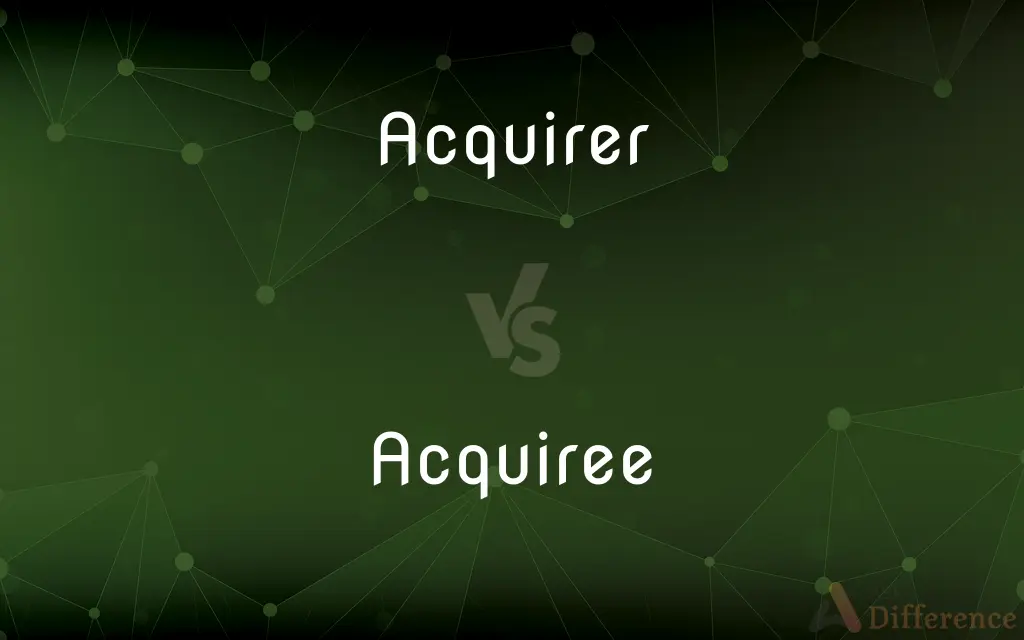Acquirer vs. Acquiree — What's the Difference?
Edited by Tayyaba Rehman — By Fiza Rafique — Updated on March 27, 2024
An acquirer is a company that purchases another (the acquiree) to expand its operations. The acquirer takes control, whereas the acquiree is integrated into the buyer's operations.

Difference Between Acquirer and Acquiree
Table of Contents
ADVERTISEMENT
Key Differences
An acquirer is typically a larger, more financially robust entity looking to purchase another company to enhance its market share, access new markets, or acquire new technologies. On the other hand, the acquiree is the company being purchased, often to gain strategic advantages, resolve financial difficulties, or benefit from being part of a larger organization.
The acquirer initiates the transaction, employing various strategies and negotiations to take over another company. Meanwhile, the acquiree is the target of the purchase, which may seek to maximize the sale's terms for its shareholders' benefit.
Financially, the acquirer uses its resources, possibly including cash reserves, stock options, or debt instruments, to finance the acquisition. Conversely, the acquiree's valuation, including its assets, liabilities, and potential for growth, plays a crucial role in determining the purchase price.
Post-acquisition, the acquirer usually integrates the acquiree's operations, personnel, and assets into its own structure, aiming to create synergies. The acquiree, however, loses its previous autonomy, becoming a part of the acquirer's larger organization.
The strategic goals of the acquirer often include diversification, eliminating competition, or gaining new technologies. In contrast, the acquiree might aim to benefit from the financial strength and broader market presence of the acquirer.
ADVERTISEMENT
Comparison Chart
Definition
A company that purchases another company.
A company being purchased by another company.
Financial Role
Uses its resources to finance the acquisition.
Its valuation determines the purchase price.
Strategic Goal
Seeks to expand operations or enter new markets.
Aims to benefit from joining a larger organization.
Operational Role
Integrates the acquiree into its operations.
Gets integrated into the acquirer's operations.
Autonomy
Maintains its decision-making power.
Loses autonomy and becomes part of the acquirer.
Compare with Definitions
Acquirer
An organization that integrates acquired companies into its operations.
The company, as an acquirer, streamlined the integration process for efficiency.
Acquiree
A company being bought by another company.
The acquiree was a small startup with promising technology.
Acquirer
An entity involved in acquiring other firms for strategic advantages.
As an acquirer, the corporation sought to dominate the market.
Acquiree
A firm that is targeted for acquisition for its assets or technology.
As an acquiree, the company received a significant valuation.
Acquirer
A business executing mergers and acquisitions to grow.
The tech giant became the leading acquirer in the industry last year.
Acquiree
A business that becomes part of a larger entity after acquisition.
The acquiree's team was integrated into the larger corporation's R&D department.
Acquirer
A company that purchases other companies to expand its business.
The acquirer planned to purchase several small startups to innovate faster.
Acquiree
An organization that loses autonomy as it is absorbed by an acquirer.
Post-acquisition, the acquiree operated under the new corporate structure.
Acquirer
A company using its capital to buy out competitors.
The acquirer used its substantial cash reserves for the takeover.
Acquiree
A company that negotiates its sale to maximize shareholder value.
The acquiree worked with advisors to ensure the best terms.
Acquirer
To gain possession of
Acquire 100 shares of stock.
Acquiree
A company that is the subject of a corporate acquisition or merger
The management of the potential acquiree isn't keen on selling
Acquirer
To get by one's own efforts
Acquire proficiency in math.
Acquiree
Something that is to be acquired, especially a company that is the target of a takeover
Acquirer
To gain through experience; come by
Acquired a growing dislike of television sitcoms.
Acquirer
To locate (a target) with an aiming device or a tracking system, such as radar.
Acquirer
One who acquires.
Acquirer
A bank or financial institution that processes credit card or debit card payments on behalf of a merchant.
Acquirer
A person who acquires.
Acquirer
A person who acquires something (usually permanently)
Acquirer
A bank gaining financial control over another financial institution through a payment in cash or an exchange of stock
Acquirer
The financial institution that dispenses cash in automated teller machines and collects a fee from the bank that issued the credit card
Acquirer
A credit card processing bank; merchants receive credit for credit card receipts less a processing fee
Common Curiosities
What is an acquirer?
An acquirer is a company that purchases another company, typically to expand its business operations or enter new markets.
How does an acquirer finance an acquisition?
An acquirer may use cash reserves, stock options, or debt instruments to finance the purchase of an acquiree.
What are the strategic goals of an acquirer?
The strategic goals of an acquirer can include expanding market share, accessing new technologies, or eliminating competition.
Can an acquiree refuse to be acquired?
An acquiree can refuse to be acquired if its shareholders or management do not agree with the terms of the acquisition.
What is an acquiree?
An acquiree is a company that is being purchased by another company, often to gain strategic advantages or resolve financial challenges.
What happens to the acquiree after an acquisition?
After an acquisition, the acquiree is integrated into the acquirer's operations, losing its previous autonomy and becoming part of the larger organization.
Why might a company want to be an acquiree?
A company might want to be an acquiree to benefit from the financial strength, market presence, or operational resources of a larger organization.
What are the benefits of being an acquirer?
Benefits of being an acquirer include enhanced market presence, diversified operations, and potential cost synergies.
What is the difference between a merger and an acquisition?
A merger involves two companies combining into a new entity, while an acquisition involves one company purchasing another and integrating it into its operations.
How is the purchase price of an acquiree determined?
The purchase price of an acquiree is determined by its valuation, which includes assets, liabilities, and growth potential.
Do all acquisitions lead to the acquiree losing autonomy?
While many acquisitions result in the acquiree losing autonomy, some arrangements allow the acquiree to operate semi-independently.
How do acquisitions affect employees of the acquiree?
Acquisitions can lead to changes in roles, restructuring, or integration challenges for employees of the acquiree.
What role do negotiations play in the acquisition process?
Negotiations are crucial in the acquisition process for determining purchase terms, valuation, and integration plans.
Can an acquirer target any company as an acquiree?
An acquirer can target any company as an acquiree, but the success of the acquisition depends on mutual agreement and strategic fit.
What challenges might an acquiree face post-acquisition?
Challenges for an acquiree post-acquisition can include cultural integration, loss of autonomy, and operational changes.
Share Your Discovery

Previous Comparison
Annual vs. Yearly
Next Comparison
Tangy vs. TartAuthor Spotlight
Written by
Fiza RafiqueFiza Rafique is a skilled content writer at AskDifference.com, where she meticulously refines and enhances written pieces. Drawing from her vast editorial expertise, Fiza ensures clarity, accuracy, and precision in every article. Passionate about language, she continually seeks to elevate the quality of content for readers worldwide.
Edited by
Tayyaba RehmanTayyaba Rehman is a distinguished writer, currently serving as a primary contributor to askdifference.com. As a researcher in semantics and etymology, Tayyaba's passion for the complexity of languages and their distinctions has found a perfect home on the platform. Tayyaba delves into the intricacies of language, distinguishing between commonly confused words and phrases, thereby providing clarity for readers worldwide.















































